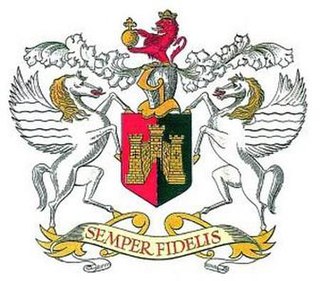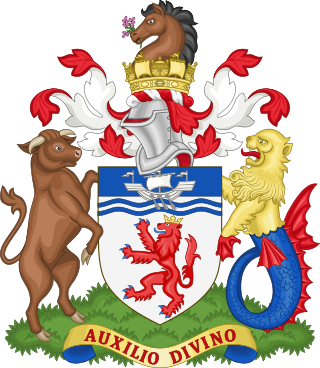Exeter City Council is the local authority for Exeter in Devon, England. One third of the council is elected each year, followed by one year without election.

Exeter City Council is the local authority for Exeter, a non-metropolitan district with city status in Devon, England.

Devon County Council is the county council administering the English county of Devon. Based in the city of Exeter, the council covers the non-metropolitan county area of Devon. Members of the council (councillors) are elected every four years. Almost all councillors are members of the major national political parties.

The 2010 United Kingdom local elections were held on Thursday 6 May 2010, concurrently with the 2010 general election. Direct elections were held to all 32 London boroughs, all 36 metropolitan boroughs, 76 second-tier district authorities, 20 unitary authorities and various Mayoral posts, all in England. For those authorities elected "all out" these were the first elections since 2006. The results provided some comfort to the Labour Party, losing the general election on the same day, as it was the first time Conservative councillor numbers declined since 1996.

The 2012 Exeter City Council election took place on 3 May 2012, to elect members of Exeter City Council in Devon, England. The election was held concurrently with other local elections in England. One third of the council was up for election; the seats up for election were last contested in 2008. The Labour Party gained overall control of the council, which had been under no overall control since 2003. The Liberal Party was wiped off the council.

The 2015 Exeter City Council election took place on 7 May 2015, to elect members of Exeter City Council in Exeter, Devon, England. This was on the same day as other local elections.

The 2016 Exeter City Council election took place on 5 May 2016, to elect members of Exeter City Council in England. Following boundary changes, the entire council was up for election, and all 13 wards were contested, each electing three councillors. The election was held concurrently with other local elections held in England on the 5 May.

The 2010 Norwich City Council election took place on 9 September 2010 to elect members of Norwich City Council in England. One third of seats were up for election. The elections took place later in the year than other local elections. Norwich had previously been granted permission to become a unitary authority, with local elections postponed until 2011. When the Coalition Government won the general election earlier that year, Norwich's permission to form a unitary authority was overturned. Because of this, the High Court ruled that those councillors who had stayed on beyond their four-year term were no longer constitutionally elected, and would need to seek re-election. This resulted in there being an election in every ward in September to renew the mandate for the wards.

The 2018 Exeter City Council election took place on 3 May 2018 to elect a third (13/39) of the members of Exeter City Council in England. This was on the same day as other local elections. The election result left the council with the same political make up as it had before the election, with Labour in control with 29 seats and the Conservatives as the main opposition party, returning with 8.

The 2000 Exeter City Council election took place on 4 May 2000, to elect members of Exeter City Council in England. The entire council was up for election following boundary changes, which increase the number of seats from 36 to 40. The election was held concurrently with other local elections in England. The Labour Party retained control of the council, which it had held since 1995.

The 2002 Exeter City Council election took place on 2 May 2002, to elect members of Exeter City Council in England. The election was held concurrently with other local elections in England. One third of the council was up for election and the Labour Party retained control of the council, which it had held since 1995.

The 2003 Exeter City Council election took place on 1 May 2003, to elect members of Exeter City Council in Devon, England. The election was held concurrently with other local elections in England. One third of the council was up for election and the Labour Party lost control of the council, which it had held since 1995.

The 2004 Exeter City Council election took place on 10 June 2004, to elect members of Exeter City Council in Devon, England. The election was held concurrently with other local elections in England. One third of the council was up for election and the council remained under no overall control.

The 2006 Exeter City Council election took place on 4 May 2006, to elect members of Exeter City Council in Devon, England. The election was held concurrently with other local elections in England. One third of the council was up for election and the council remained under no overall control.

The 2007 Exeter City Council election took place on 3 May 2007, to elect members of Exeter City Council in Devon, England. The election was held concurrently with other local elections in England. One third of the council was up for election and the council remained under no overall control.

The 2008 Exeter City Council election took place on 1 May 2008, to elect members of Exeter City Council in Devon, England. The election was held concurrently with other local elections in England. One third of the council was up for election and the council remained under no overall control.

The 2010 Exeter City Council election took place on 9 September 2010 to elect members of Exeter City Council in England. One third of seats were up for election. The elections took place later in the year than other local elections. Exeter had previously been granted permission to become a unitary authority, with local elections postponed until 2011. When the Coalition Government won the general election earlier that year, Exeter's permission to form a unitary authority was overturned. Because of this, the High Court ruled that those councillors who had stayed on beyond their four-year term were no longer constitutionally elected, and would need to seek re-election. This resulted in there being an election in every ward in September to renew the mandate for the wards.

The 2011 Exeter City Council election took place on 5 May 2011, to elect members of Exeter City Council in Devon, England. The election was held concurrently with other local elections in England. One third of the council was up for election; the seats up for election were last contested in 2007. The council remained under no overall control with the Labour Party as the largest party.

The 2019 Exeter City Council election took place on 2 May 2019 to elect the members of Exeter City Council in Devon, England. This was on the same day as other local elections. 14 of the 39 seats were up for re-election: those of the candidates who had finished second in the all-out election of 2016, with a double vacancy in Priory ward. The Labour Party remained in control with 29 seats, with the Conservatives as the main opposition party, with 6 seats.

The 2022 Exeter City Council election took place on 5 May 2022 to elect members to Exeter City Council in Devon, England. This was the same day as other local elections in the United Kingdom. 17 of the 39 seats were up for election, one councillor in each of the 13 wards, and 4 by-elections. These wards were last contested in 2018.



















